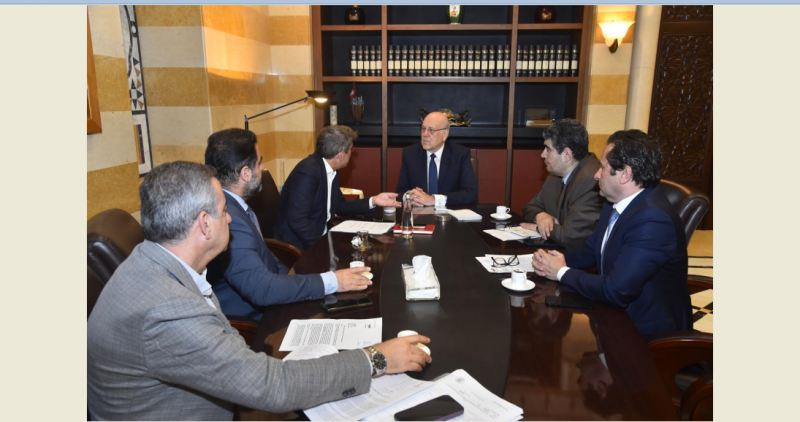
Meeting between caretaker Prime Minister Najib Mikati, Minister of Energy Walid Fayyad and the Lebanese Petroleum Administration on May 22. (Credit: NNA)
BEIRUT – Lebanese caretaker Energy Minister Walid Fayyad has emphasized the need for the public sector to pay its dues to Électricité du Liban (EDL), the state-run National News Agency reported on Wednesday.
Fayyad made this comment following a meeting with caretaker Prime Minister Najib Mikati and the Lebanese Petroleum Administration, and a second meeting with Mikati and EDL's general manager, Kamal Hayek. Both meetings took place at the Grand Serail in Beirut.
After these meetings, Fayyad stressed the "need for the public sector to pay its bills, especially since the cabinet and the Finance Ministry allocated a treasury advance of LL6,000 billion ($67,039,106) to pay all dues from Oct. 2022 to the end of June 2023."
According to Fayyad, "Public administrations and institutions have not paid a single penny to Electricité du Liban" so far.
EDL said that it has "no choice but to cut electricity starting from the middle of June" if public administrations do not settle their dues.
EDL announced in February that public administrations that had not yet paid their electricity bills had until Feb. 29 to do so and that power would be cut to entities that did not pay.
EDL was not immediately available to provide comment to L'Orient Today on what had happened since February and why the public electricity supplier is raising the issue now.
The public electricity supplier's structural problems have been exacerbated by Lebanon's ongoing financial crisis, which began in 2019. However, the authorities' decision at the end of 2022 to raise electricity tariffs, which prior to then had been unchanged since 1994, has had some impact on improving power provision.
Fayyad also discussed on Wednesday the dues owed by Electricité du Liban to funds and creditors, such as the Kuwait Fund for Arab Economic Development and others.
According to Fayyad, Hayek said during the meeting that the "dues owed by the state and EDL from the loans of the Arab funds, which range between $5 million and $8 million that were owed from 2020 until the end of 2023, have been paid."
Fayyad added that this is very important because it restores EDL's regular relationship with its Arab fund creditors and "opens the way for renewed funding from these funds."
"We are relying on the Kuwait Fund for Arab Economic Development to restore the electricity building and the control center, that were [damaged by the Beirut Port explosion], because it helps manage electricity distribution and transmission … more accurately," Fayyad added.
L'Orient Today contacted Hayek for more information about the Kuwait Fund for Arab Economic Development but he was not immediately available for comment.
Lastly, Fayyad said that the "step of switching to gas" was also discussed in the meeting.
"Since the expected Egyptian gas was delayed for political reasons, we are looking at the possibility of establishing gasification plants through a tender in this framework," he said.
Lebanon signed a deal to receive natural gas from Egypt via Syria in 2022, but the agreement has not been implemented due to a funding problem and sanctions against Syria.